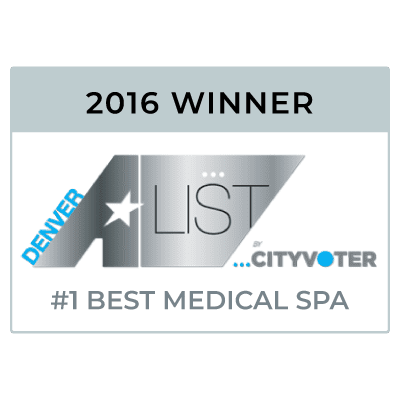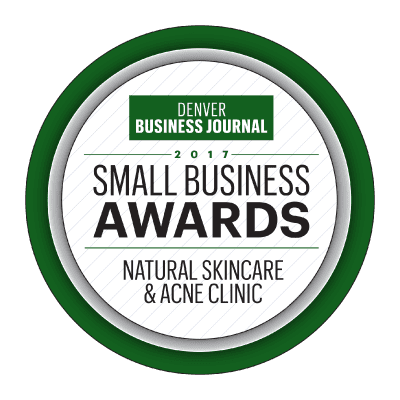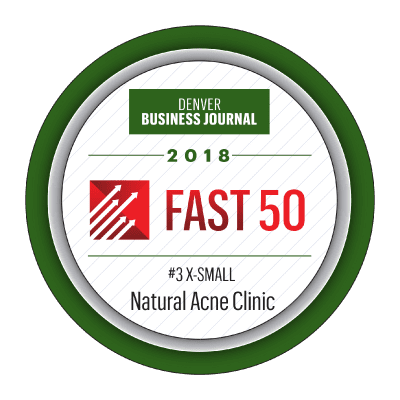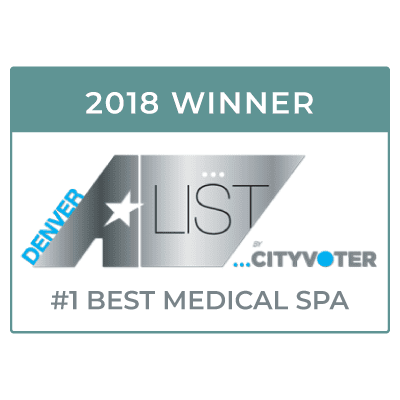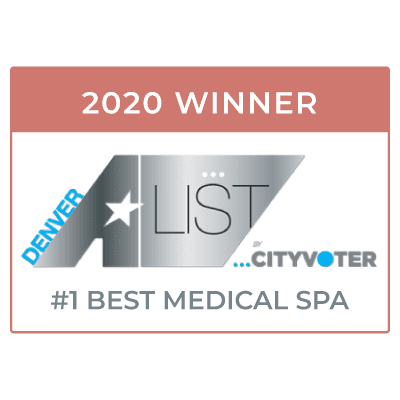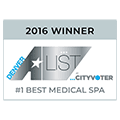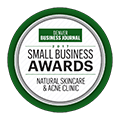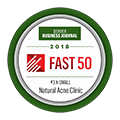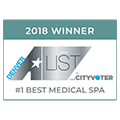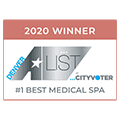No products in the cart.
Adult Acne Treatment
It’s morning. You roll out of bed, into the bathroom. Ready to jump in the shower. Catch a glimpse in the mirror and—darn it! More breakouts.
What the heck, right? You’re an adult. You’re supposed to be way past acne by now. But on and on it goes. And whether mild, severe or anywhere in between, it’s upsetting and frustrating and you want it to end.
But why do you have acne as an adult? What’s causing it? How’s it different from teen acne and do you really need to treat it differently? What adult acne treatment can actually work to stop breakouts? Can you do it naturally?
Bet you have a lot of questions like these and more. All deserving straight-up answers so you can make informed decisions about your skincare. So read on. We’ve got answers that put you on the RIGHT path to clearing your skin for good, and finally, make breakouts a thing of the past.
CONTENTS
If you’re breaking out and female, age 24 and older, or male and age 22 and older, you have had adult acne. While those who grow out of teen acne can breathe a sigh of relief, unfortunately, adult acne is hard to shake.
That’s because adult acne is a genetic condition called retention hyperkeratosis.
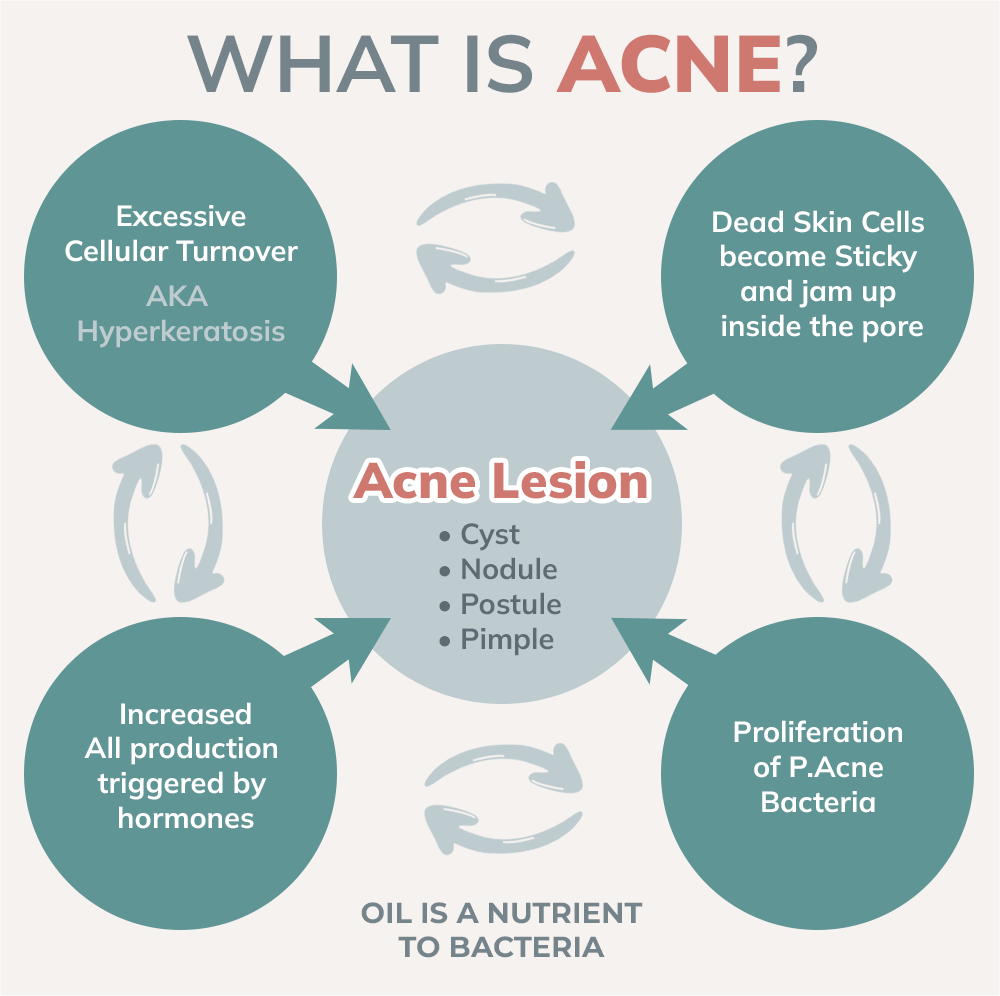
Here’s what happens.
Every day, a layer of dead skin cells sheds inside the pore. Ordinarily, these dead skin cells are pushed from behind by newer cells rising to the skin’s surface, then flake off in a normal, healthy pore.
However, this continuous shedding process goes haywire in people with adult acne. Acne-prone skin produces up to 5x more dead cells than normal, and the excess dead cells stay stuck on the skin’s surface and clog your pores. The resulting plug (known as a microcomedone), when mixed with oil, forms a blackhead. When infected with bacteria, forms a blemish.
Essentially, your acne-prone skin is perpetually clogging itself. And your unique blend of acne triggers (more on that later) aggravates and worsens this already faulty situation.
But don’t worry, you can still get clear! You are not doomed to breakouts forever. And that’s exactly what you’re about to discover in this guide.
Sadly, no!
You can never be too old for acne.
Me and my team of Clear Skin Specialists have helped thousands of clients. Many are in their twenties. Yet, we often see women and men in their thirties, even their forties and beyond. They come to us suffering from persistent acne from their teen years. They could never figure out an adult acne treatment that would work, despite trying every potion, remedy and med under the sun.
Often too, people who never had acne as a teen start breaking out as an adult. This is called late-onset acne.
It’s especially common among women, due to their fluctuating hormones during pregnancy, shifts in the menstrual cycle through perimenopause and menopause, as well as changing methods of contraception throughout their adult years.
You should also be aware, as reported by The International Dermal Institute, “Clinical studies indicate that between 40 and 55 percent of the adult population age 20-40 are diagnosed with low grade, persistent acne and oily skin. And according to the Journal of American Academy of Dermatology, 54 percent of women older than age 25 have some facial acne.”
What’s more, both persistent and late-onset acne is often associated with inflammation, changes in pigmentation and scarring. Facts to keep in mind as you consider the importance of an effective adult acne treatment.
If you’ve been searching for an effective adult acne treatment, there’s something you might not be aware of.
We created a short quiz to help you Discover YOUR Primary Acne Cause
Do you know YOUR primary acne cause?
Still struggling with an unsure self-diagnosis?
Hidden root causes—including hormonal swings, gut imbalances, stress, and certain foods—trigger your acne from the inside out. Like a fingerprint, these root causes (or “acne triggers”) show up in different ways and combinations in every individual. Including you!
Most people have one primary trigger that always messes with their skin. They also typically have several secondary triggers. These often include pore-clogging ingredients in their skincare, makeup and beauty products, which make their breakouts worse.
Until every one of your acne triggers is identified and conquered, they’ll constantly aggravate and perpetuate your adult acne.
- Hormones
- Imbalances in your hormones can aggravate adult acne, which is why finding your body’s healthy balance of estrogen, progesterone, and androgen is critical. As a female, you’ll most likely experience hormonal acne around the mouth, chin, and along the jawline. The week before your period is when the most hormonal acne flares up.
- Thankfully, just as we treat our clients in the Online Acne Program, you can naturally rebalance your body with the right herbs and supplements. Unlike birth control pills that tell your hormones exactly what to do, clean, powerful supplements and herbs allow your body and nature to achieve healthy equilibrium, without harmful side effects.
- Gut Imbalance
- Living inside your gastrointestinal tract is an entire universe of 300 to 500 million bacteria and other microorganisms. Antibiotics, Accutane, diet, stress, constipation, hormonal swings and more can wreak havoc on this beneficial microbiome. And there’s growing evidence that toxins from the gut caused by upset and imbalances can enter your bloodstream. This infiltration can create systemic inflammation, which in turn triggers adult acne.
- What to do? Avoid the harmful side effects of acne meds. Instead, rely on therapeutic-grade Probiotics, Oil of Oregano, and certain other herbs and supplements to naturally rebalance your gut microbiome.
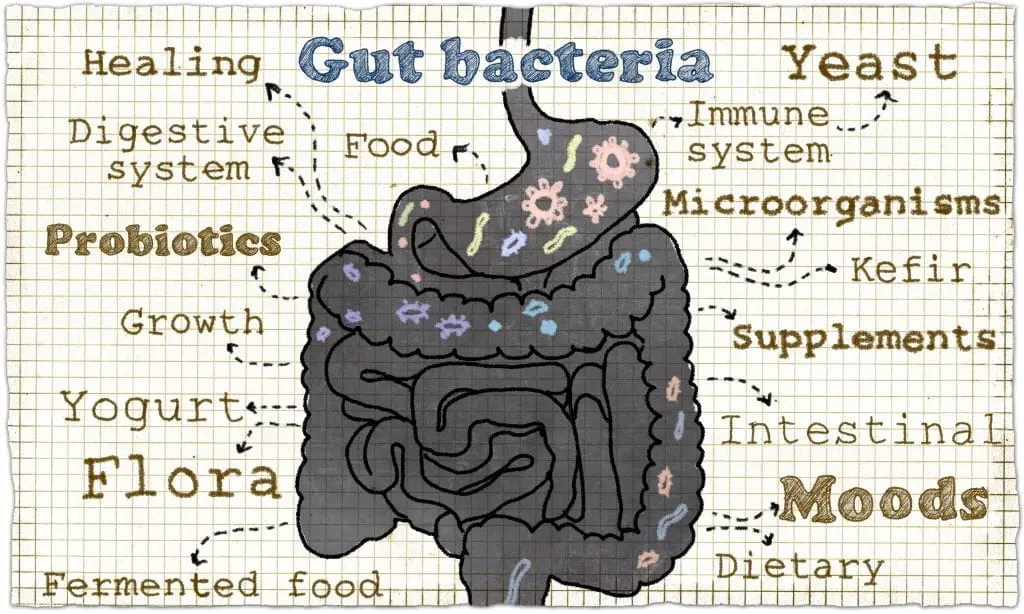
- Stress
- Rough days at work, exams, health issues, testy family situations—stressful situations like these can trigger breakouts. Even something you’re really looking forward to, like a big date or a vacation can trigger adult acne. That’s because stress activates your adrenal glands, and elevates androgen production, which in turn can result in acne flare-ups in acne-sensitive pores.
- What to do? You can naturally relieve stress and acne with the right combination of proven self-care methods AND the right supplements to strengthen, support and rebuild your adrenal glands.
- Diet
- Surprise! Many ordinary “good-for-you” foods trigger adult acne breakouts. For many of our clients, the biggest food-related trigger is iodine. Iodine is added to table salt and found in cow’s milk dairy products, like yogurt and cheese. Seafood and sea plants, naturally high in iodine, are also common culprits. Once iodine enters the bloodstream, any excess is excreted through the oil glands, which irritates the pores and triggers acne.
- What to do? Avoid or minimize any cow dairy-related foods and other overly salty foods in your diet. Also, track and identify any other foods that cause breakouts. Replacing these foods with skin-safe alternatives is an important way to start getting adult acne under control.
- Clients in our Online Acne Program make this easier with my Clear Skin From Within Cookbook. It’s explicitly designed to help acne sufferers eliminate the diet trigger for good.
- Pore Clogging Ingredients
- Almost ALL soaps, laundry detergents, makeup, and skin, hair and beauty care products―even acne care products―contain one or several of the 125+ ingredients known to clog pores. Once they touch the skin, these ingredients blanket your pores, allowing MORE dead skin cells and bacteria to accumulate. No wonder they make your acne worse!
- What to do? Examine the ingredients list on every product that touches your skin. If any product has pore cloggers inside, give them to someone without acne. You can research pore-clogging ingredients here.
If you’d rather save yourself a major headache, grab an easy-peasy Online Acne Consult. You get our entire list of 125 proven pore-clogging ingredients. Plus, you get a Custom Acne Treatment Plan that details powerful, squeaky clean acne care products that are perfect for healing YOUR skin.
If you’re a teen with acne or had it as an adolescent, you’re not alone. Studies indicate that nearly 85% of the population age 12 to 24 has acne. And 20% of teens with acne end up with adult acne.
But why does it matter? Is there a difference between teen and adult acne? Here are some enlightening facts.
- TEEN ACNE
- During puberty, excess hormones cause overactive oil glands, which result in acne.
- Teenage acne tends to show up all over the face, back, chest and shoulders. Teens also tend to have more blackheads and clogged pores.
- Girls often get non-inflamed bumps on the forehead starting at age 10-12. Around 13 or 14, their acne slips to the cheeks and chin, and becomes red and inflamed.
- Boys typically get red, inflamed breakouts on the cheeks, jawline and chin at 14-16, when they hit adolescence. Around 17, when testosterone is running high, they have a higher likelihood of developing scarring, cystic acne. Most teens outgrow acne.
- ADULT ACNE
- For adults, acne is often a result of several interacting factors.
- Hormonal swings and imbalances, gut imbalances, countless avenues of stress and certain foods trigger adult acne. Certain medications, supplements, ill-advised skincare regimens, pore-clogging ingredients and more also contribute.
- Adult acne mainly affects women, who experience seborrhea (a common, red, itchy rash that can appear on your scalp and body), comedones and inflammatory lesions.
- Adult acne is commonly found as nodules (red, inflamed and about the size of a pencil eraser) on the lower face, chin, and jawline.
- Adults with acne can’t outgrow it. Adult acne needs to be continually addressed using a whole-body approach to keep it under control.
If there’s one thing I’ve learned from my clients, they take care of their skin. The problem is, they come to Natural Acne Clinic with a handful of practices that make their adult acne worse.
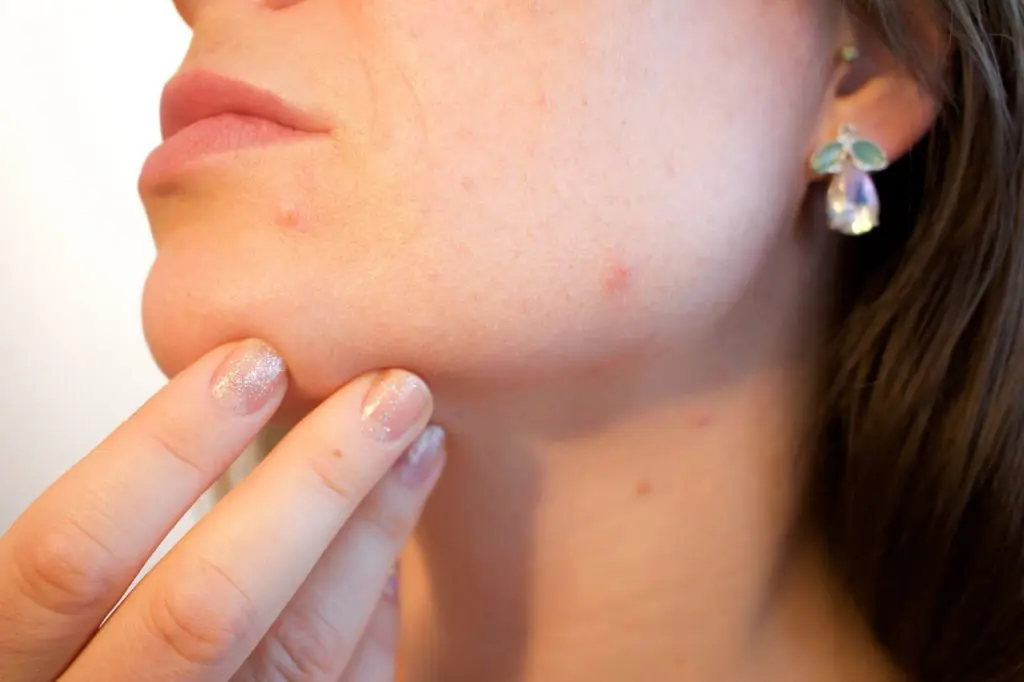
Why? Because of misleading and inaccurate information about adult acne treatments they discover online. From dermatologists and other healthcare professionals, and family and friends. As well as from bloggers and influencers, skincare brands and Big Pharma. It’s a jungle of misinformation out there!
When it comes to adult acne care, people often make many mistakes that are detrimental to their skin. Such mistakes include sticking to a single skincare regimen, spot treating your breakouts and using pore-clogging ingredients in your products. You can read about these TOP culprits here.
Now let’s take a closer look at four other adult acne treatment mistakes, associated with each of the main acne triggers:
- Skincare Mistake #1 ― HORMONES
- Did you know? Only high-estrogen birth control pills help acne, all others are acne triggers. For example, low-dose estrogen contraceptives cause estrogen to go down and androgen levels to go up. The elevated androgens bind to oil glands in the skin, telling the oil gland to produce more sebum. This excess oil combines with dead skin cells, debris and bacteria, and causes pimples to form.
- What to do instead? Consult with your doctor about switching to a high-estrogen birth control pill to help avoid triggering acne. To avoid acne triggering birth control, click here now.
- Skincare Mistake #2 ― GUT
- It’s a fact. Antibiotics and Accutane are destructive adult acne treatment choices for your body and skin. Antibiotics wipe out good and bad bacteria in your gut biome, leaving you vulnerable to toxins entering your system. In turn, this can lead to systemic inflammation and increased risk for acne.
- Accutane use is known for damaging the gut and depleting it of all beneficial bacteria. It’s not uncommon for someone who’s used Accutane more than once to develop autoimmune disorders such as Crohn’s Disease or Colitis.
- What to do instead? Avoid these toxic meds! To rebalance your gut AND help stop breakouts, use a high-quality probiotic with at least 40-75 parts per billion. It should also contain at least eight different strands of beneficial bacteria, including Lactobacillus and Bifidobacterium.
- Skincare Mistake #3 ― STRESS
- If you’re a woman, know that you’re at higher risk for recurring stress-induced adult acne! Studies show that women’s daily skincare routines―including jobs, and taking care of kids, home and partners―play a major role. Lack of sleep adds to stress, which can negatively impact health, hormonal secretion, and immunity. The result? Your adrenal glands produce elevated androgen hormones, which in turn stimulate the sebaceous glands beneath the skin and trigger inflamed breakouts.
- What to do instead? One awesome adult acne treatment is making time to take care of yourself! Play, meditate, do yoga, exercise, read a good book, laugh. Create a daily plan to chill. And use a high-quality adrenal support supplement, so you can relax and get stress-related acne under control.
- Skincare Mistake #4 ― DIET
- As noted above, iodine found in cow dairy products, as well as seafood and sea plants is one of the most common (and unsuspected) diet-related acne triggering culprits out there.
- As you’ve learned, once iodine enters the bloodstream, any excess is excreted through the oil glands, which in turn irritates the pores and triggers acne breakouts.
- Now that you have this information, one of the biggest skincare mistakes you can make is to ignore it.
- What to do instead? Be a detective. If that big dish of mac and cheese or ice cream cone is triggering more breakouts (usually 24 to 48 hours after eating), give it up for a few weeks and see if it makes a difference. Then give oat, almond or cashew milk a whirl; they’re all refreshing to drink and in your cereal. Look for cheese made with sheeps’ milk; there are many varieties (Manchego is a personal favorite). And try coconut or goat milk yogurt to get your yogurt fix.
Fantastic. You now have the facts about what adult acne is, what causes it, and how to avoid making it worse. Now we’ll address the pros and cons of popular conventional and alternative acne treatment methods.
CONVENTIONAL TREATMENTS
Lotions, serums, patches, washes, “super bottles,” roll-ons, scrubs, masks and more. You’ve likely tried many adult acne treatment products. While they may clear your skin for a brief while, inevitably, they stop working. That’s because they only treat what you see on the surface of your skin.
But blackheads, pimples, and inflamed blemishes are only a symptom of the imbalances occurring inside your body. By only treating adult acne symptoms, and not the root causes, you subject yourself to constant disappointment.
Dermatologists. A highly-trained dermatologist may seem like a good choice for adult acne treatments and support. However, when it comes to clearing acne, dermatologists aren’t any better than over-the-counter products, because they only treat the symptoms of adult acne―what appears on the surface of your skin.
Yes, the antibiotic creams, pills and serums they prescribe kill the Propionibacterium acnes bacteria that causes inflamed blemishes. However, these meds don’t treat the underlying root causes of your adult acne―hormonal swings, gut imbalances, stress, acne triggering foods, and pore-clogging ingredients in your products. And as each round eventually fails, you’ll need to use increasingly toxic concentrations to get any benefit. Until, ultimately, you face the choice of using the most dangerous, last resort adult acne treatment a dermatologist could prescribe. Accutane.
ALTERNATIVE TREATMENTS
Naturopaths seek to treat the underlying causes of health issues. They tap into the body’s natural ability to self-heal, in a holistic, personalized manner. If you have adult acne, naturopaths may recommend herbs for hormone balancing and overall body health. They’ll also likely recommend a high-protein, low-carb diet including fresh-water fish, whole grains, fruit and sprouts.
But watch out! Naturopaths may advise good-for-you foods that trigger acne. And advise against sugar, nut butter, and fried food, none of which cause acne. What’s more, they likely won’t address other important acne triggers that may be messing with your skin.
Endocrinologists diagnose and treat problems related to the endocrine system. This system of glands releases hormones to regulate metabolism, respiration, growth, reproduction, sensory perception and movement. Because routine hormonal testing and interpretation are complex, it’s not usually used for acne, because most people’s hormone levels are within a normal range.
However, exceptions are typically made for people with severe cystic acne and young children with acne and early-onset body odor and pubic hair. Exceptions are also made for women with Polycystic Ovarian Syndrome. This is a hormonal imbalance that causes them to skip menstrual periods and, instead of eggs, release small, fluid-filled cysts from their ovaries.
Endocrinologists can play a vital role in addressing the hormonal aspects of acne. However, as you’ve learned, unless ALL acne triggers are pinpointed and addressed, blemishes will keep coming back no matter how well you conquer one acne trigger.
Acupuncture is based on the idea that almost all disease arises from blockages and imbalances in the body. Using fine needles, and applying heat or electrical stimulation at precise bodily points, trained acupuncturists use this traditional Chinese medicine to remove stagnations. Acupuncture also relieves pain, promotes healing, and improves physical, mental, and emotional health.
Using Chinese face mapping, an acupuncturist will attempt to address the underlying root cause of adult acne, such as diet, emotions or hormones. They may suggest dietary changes, and Chinese herbs and supplements to augment the acupuncture. However, unless they’re trained acne experts, they’ll likely overlook important bodily cues and strategies to clear your skin.
A professional nutritionist can help you create a healthy, whole-foods diet and design meal plans that will make your body feel better and more energized. They may also suggest supplements, ample hydration, and advise you about the impact of stress or hormonal imbalance on adult acne.
All of these tactics are important contributors to healthy skin. However, nutritionists may unknowingly advise you to eat good-for-you foods―like organic whole eggs, seafood and sea plants, yogurt, kefir and peanuts―which will perpetuate your acne instead of making it better.
Here’s the bottom line…
These experts are NOT adult acne specialists. It’s unlikely they’ve studied or specialized in the myriad, interconnected ways hormones, gut, stress, diet, topical products, supplements, herbals, acne care products, and regimens must ALL be balanced and optimized to create clear skin.
Anyone or more of these experts may have an important role in your adult acne treatment. However, if you want clear skin, it’s critical you seek the help of a seasoned acne specialist with a proven track record.
Telemedicine is a “virtual visit” with a healthcare provider via video conference on your phone, tablet or laptop. It’s been around for 20+ years,is part of the medical mainstream, and provides access to specialized care when a patient couldn’t get there otherwise.
When it comes to healing your acne, telemedicine may be the answer you seek. The right acne specialist offering a powerful, natural adult acne treatment system can help you, even online! No matter where you live in the world, you can access their services.
If you’re a guy feeling alone and persecuted with your acne, you’re not alone! Studies show that up to 43% of men age thirty and younger struggle with inflamed acne.
Male acne typically appears on the face, neck, shoulders, and back. Three of the seven key contributors to male adult acne include a stressful lifestyle, sweaty exercise and medically-supported, anti-aging testosterone therapies.
Whether you’re a man or woman, know that adult acne can impact your mental well-being. That, in turn, can lead to feelings of embarrassment, isolation, depression, anxiety and unattractiveness.
The best way to begin treating male adult acne is to evaluate the severity.
First, determine if your adult acne is inflamed or non-inflamed. Then pinpoint which root causes are messing with your skin. For example:
- Hormones (almost guaranteed)
- Gut imbalance (likely if you’ve ever taken antibiotics or Accutane)
- Stress (for sure if you lead a hectic lifestyle or have an intense job)
- Diet (there are many ways to trip up here!)
Once you’ve pinpointed the severity and root causes, consider a natural, whole-body adult acne treatment approach. It’s the best way to protect and heal your skin and energize your body.
Such an approach includes clean, powerful supplements and herbs tailored to address each acne trigger. Key lifestyle adjustments, such as eliminating pore-clogging ingredients from your stash of skin and body care products, and following a skin-safe diet plan, are also essential to success.
Here’s something else to keep in mind.
It’s a proven fact that your skin will adapt to any new acne clearing regimen after two or three weeks, then stop responding. It’s also a proven fact that acne forms under your skin’s surface for 90 days before you physically see a breakout.
Here’s what that means if you want to heal existing blemishes, prevent NEW blemishes from forming AND finally break the acne cycle. For 90 days, you must change your skincare regimen every two weeks to continuously challenge your skin, and keep it guessing and healing.
In fact, challenging your skin continuously for 90 days is the PIVOTAL reason for our 95% success rate. It’s also a powerful, life-changing strategy unique to Natural Acne Clinic.
Adult Acne Treatment – FAQs
Here’s the most important thing you should know: Successfully treating acne requires a WHOLE BODY approach. Focusing on a SINGLE trigger like hormones isn’t enough. That’s because you very likely have secondary acne triggers messing with your skin, such as gut imbalances, stress and certain foods. As well as other instigators such as pore-clogging ingredients, and ineffective skincare regimens and products.
YES! The first step is (1) identify ALL your possible acne triggers. Then (2) implement a safe, powerful, adult acne treatment plan that addresses ALL triggers, ALL at once. And which relies on clean, powerful supplements, herbs and lifestyle changes. (3) Keep up the good work for 90 days to heal existing blemishes, stop new ones from forming and finally break the acne cycle.
Keep in mind, there’s more to healing and clearing your skin than just taking supplements. However, clean, powerful supplements are a critical pillar in the fight against adult acne. For example, that’s why each client in our Online Acne Program receives a customized supplement plan, which includes chasteberry vitex, probiotics, saw palmetto, our proprietary adrenal formula and more, depending on their unique skin and lifestyle.
Sorry to say, because of genetic predisposition and a plethora of triggers, you could suffer with acne for decades, if not your entire life. That’s why it’s imperative you begin controlling your adult acne with a natural, whole-body approach that tackles the root causes.
Accutane and its generic counterpart, isotretinoin, belong to a class of drugs called retinoids (man-made vitamin A derivatives). Available only by prescription, it works by decreasing oil (sebum) production. While it helps some people, the results don’t last, even after multiple rounds of 4-to-6 months each. Within half a year of completing their treatment, patients often begin breaking out again.
Even worse, Accutane use has many, many dangerous side effects. These include severe constipation, bowel disease, Crohn’s disease, organ, joint and vision damage, along with depression and suicide risk. There is NO NEED to resort to Accutane to clear your adult acne. Not when a safe, natural, proven method is readily available.
Summary
Congrats! You’ve just opened a treasure chest of information my Clear Skin Specialists and I rely on EVERY DAY to help our adult acne clients clear their skin for good.
Here’s what you need to remember:
A safe, natural whole-body approach is the proven path to healing and controlling your adult acne. That means pinpointing and addressing hormonal and gut imbalances, stress and diet, and banishing pore-clogging ingredients from your bathroom forever.
Now TAKE ACTION to clear your skin.
Taking action can be as simple as answering these questions:
- Have you had acne ever since you were a teen, or do you have late-onset acne?
- Which root cause do you think is triggering your adult acne the most―hormones, gut, stress or diet? If you’re not sure, take our free Acne Causes Quiz and find out right away.
- Have you tried any of the conventional or alternative adult acne treatments noted above? Which, if any, helped your skin? How long did the results, if any, last?
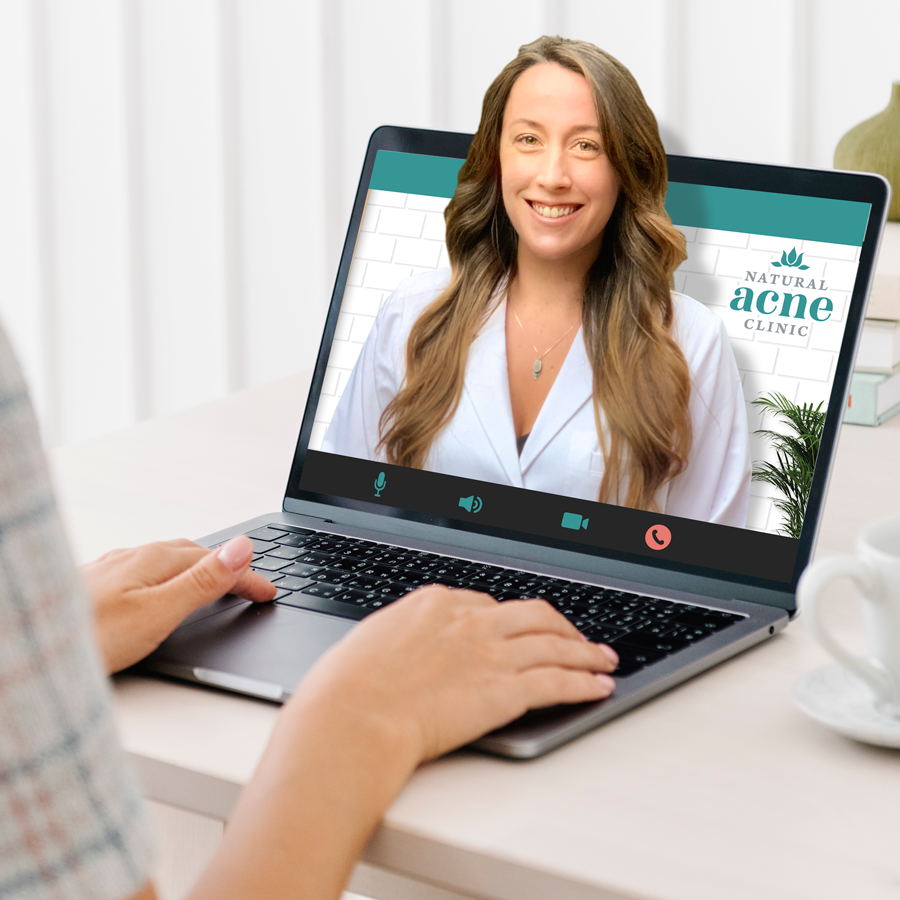
Once you’ve reflected on your answers to these questions, try some of our suggested treatments for getting your adult acne under control. However, if you’d like to make clearing your skin much easier and far more effective, you’re absolutely in the right place.
Our proven Online Acne Program has a 95% worldwide success rate. And with one of our dedicated Clear Skin Specialists, you get clear in 12 to 16 weeks. Boom. DONE.
Want to see if you’re a good candidate? Book an easy-peasy Skin Analysis & Personalized Solution. That way, you get ALL your questions answered and even get a Customized Acne Treatment Plan!
Adult acne can truly be a distant memory. Have faith. Take action. You got this!
